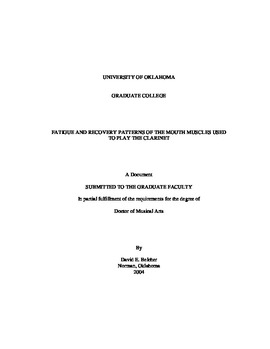| dc.contributor.advisor | Etheridge, David, | en_US |
| dc.contributor.author | Belcher, David E. | en_US |
| dc.date.accessioned | 2013-08-16T12:19:32Z | |
| dc.date.available | 2013-08-16T12:19:32Z | |
| dc.date.issued | 2004 | en_US |
| dc.identifier.uri | https://hdl.handle.net/11244/789 | |
| dc.description.abstract | For this study the fatigue and recovery patterns of one particular mouth muscle, the orbicularis oris, used while playing the clarinet was studied by using the Biopac MP 150 EMG system with non-invasive surface electrodes. Although several muscles are activated in the formation of a clarinet embouchure with the buccinator being perhaps the most active, the orbicularis oris is joined to the buccinator and is the most readily available for monitoring with non-invasive surface electrodes. The purpose of this study was to examine how and when these muscles fatigue during performance, and how a period of rest affects muscle endurance. | en_US |
| dc.description.abstract | Although sport-science researchers have done much exploration in the area of fatigue and recovery of muscles, musicians have largely failed to apply these findings to their own physically demanding activities. Fatigue and more serious medical problems such as TMJ dysfunction, focal dystonia, and carpel tunnel syndrome can and do result from the demanding rehearsal schedules imposed on performers by teachers, conductors, and themselves. Athletes are aware that a rest/recovery period after a workout is necessary for optimal gains in strength and endurance and to prevent injury. Because of research in the field of sport science, athletic training protocols also call for tapering of strenuous workouts prior to the need for peak performance on "game day." Musicians, however, often do not follow these same principles when preparing for a performance. Musicians often practice every day, often at the recommendation of a trusted teacher, and never take a day to allow the muscles involved in playing their instrument to rest and recover. Rehearsal schedules often become more intense and rigorous prior to a public performance. This often results in musicians suffering from fatigue which detracts from the quality of their performances or, more seriously, suffering from the previously mentioned medical problems. | en_US |
| dc.format.extent | v, 176 leaves : | en_US |
| dc.subject | Overuse injuries. | en_US |
| dc.subject | Overexertion injuries. | en_US |
| dc.subject | Clarinet Embouchure. | en_US |
| dc.subject | Music. | en_US |
| dc.title | Fatigue and recovery patterns of the mouth muscles used to play the clarinet. | en_US |
| dc.type | Thesis | en_US |
| dc.thesis.degree | D.M.A. | en_US |
| dc.thesis.degreeDiscipline | School of Music | en_US |
| dc.note | Source: Dissertation Abstracts International, Volume: 65-09, Section: A, page: 3207. | en_US |
| dc.note | Adviser: David Etheridge. | en_US |
| ou.identifier | (UMI)AAI3147127 | en_US |
| ou.group | Weitzenhoffer Family College of Fine Arts::School of Music | |
